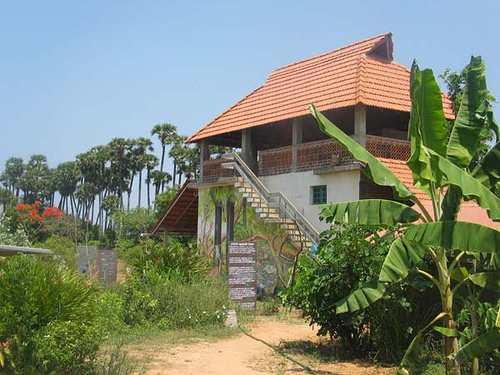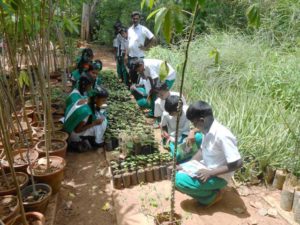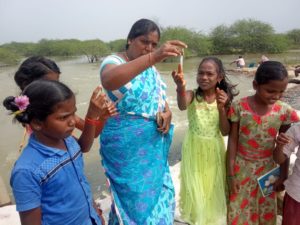Nadukuppam Environmental Education Centre (NEEC), Nadukuppam High School

Environment Education centre
Alongside our reforestation and rural women’s cooperatives, Nadukuppam High School – a rural government school – is a key focus of our outreach work in the Nadukuppam area, 12 km inland from Marrakkanam in the Villupuram district of northern Tamil Nadu.
When we first began working in the school in 2003, the academic pass rate was just 10%. There were only six teachers and three classrooms for 520 students. No water facilities or toilets were available, and there were only two trees in the school compound.
We brought in two teachers (art and ecology) to develop creative environmental awareness programs in conjunction with the existing curriculum.
Since then, progress has been swift and exciting, and the school has become a model for how targeted environmental education can bring about meaningful positive change. Highlights include:
- a dedicated environment centre on the school campus
- 500% improvement in pass rate (from 10% pass rate in 2003 to 59% pass rate in 2011)
- an indigenous plant nursery – managed, planted and developed by the students themselves
- an organic vegetable garden to provide meals for the school kitchen, and student-run organic vegetable gardens in the five surrounding villages
- over 2000 trees planted within the school compound, plus a three acre ethno-medicinal forest
- new school infrastructure: classrooms, sanitation, clean water supply and solar energy
- an educational curriculum that is being used in thirty-five other schools in the surrounding districts
You can read more details about these activities and achievements below.
INFRASTRUCTURE AND SITE DEVELOPMENT
An Environment Centre has been built on the school campus. Its primary focus is the conservation and restoration of the remaining forests and wetlands of the coastal belt, and all the other natural assets that bring social and economic benefit to the community.

Our indigenous plant nursery includes 72 species from the Tropical Dry Evergreen Forest and it provides an outlet for indigenous crops, forest and medicinal plants. The organic vegetable garden produces food for the midday school meals. Over 2000 indigenous trees have been planted within the school compound, as well as a three acre ethnomedicinal forest with detailed signs explaining practical uses of each plant. The children have also set up household organic vegetable gardens in five local villages. All these programs are maintained by students from the school’s Eco Club.

To ensure a clean and constant water supply a bore well, water tanks, hand pumps and drinking water systems have been installed, and an integrated sanitation system designed and built. This system recycles and cleans water from the new bathrooms and toilets through the use of effective micro-organisms (EM), fountains, vortex, and a lagooning system. The recycled water is then used in the demonstration gardens and nursery. Solar photovoltaics are also in operation to pump water and supply electricity.
Four new classrooms have been built to address the severe classroom shortage, and existing buildings have been improved through the provision of benches and decorative murals. School buildings were painted and signboards erected displaying pictures of the indigenous flora and fauna. Encouraged by the many developments at Nadukuppam High School, the state Education Department constructed two new school buildings and recently completed a new NABARD school building.
EDUCATIONAL PROGRAM
In addition to infrastructure improvements, an Environmental Education curriculum was developed to stimulate students and improve learning.
The curriculum is aimed at primary and middle level students and involves creating teaching materials related to our bioregion. It provides a dynamic learning experience through hands-on activities, exposure trips, eco clubs, nature camps and workshops. Through links and collaboration with the state Education Department and surrounding communities, the teachers are now implementing the Environmental Education Program in twenty schools within the Kazhuveli coastal bioregion, twelve in Villupuram and three in the Kanchipuram districts.
COMMUNITY INVOLVEMENT AND EDUCATION
The Nadukuppam Environment Education Centre serves as a focus for community involvement in integrated rural planning and sustainable development. A new centre for the activities of the Women’s Self Help Groups, especially for their income generating programs, is now completed. This provides a base for many of the outreach activities that we operate in nearby communities, encouraging environmentally friendly initiatives such as indigenous plant nursery development, organic agriculture and medicinal plant cultivation.
Thirty two acres adjacent to the Nadukuppam High School site has been developed under the Kazhuveli Environment Education Trust. This area provides a demonstration site for the community and school in organic farming techniques, agro-forestry and alternative energy (solar and wind turbine). New crops, particularly medicinal plants, flowering plants and vegetables have been introduced to local farmers. Training for local farmers is being given in organic agriculture, system of rice intensification (SRI) and vegetables gardening using vermi-compost, effective micro-organisms (EM) and natural insect techniques.
NEEC now plays an integral role in the community and has become a research and teaching space to bring biodiversity back to the Kazhuveli bioregion. The continuing growth of the NEEC forest provides students with the opportunity to observe regeneration of a diverse and rich ecosystem. A spirulina production unit has been installed the community and schools, NEEC is focused on ensuring that the natural environment importance and benefits of conserving is understood and acted upon by those who rely on it most.
